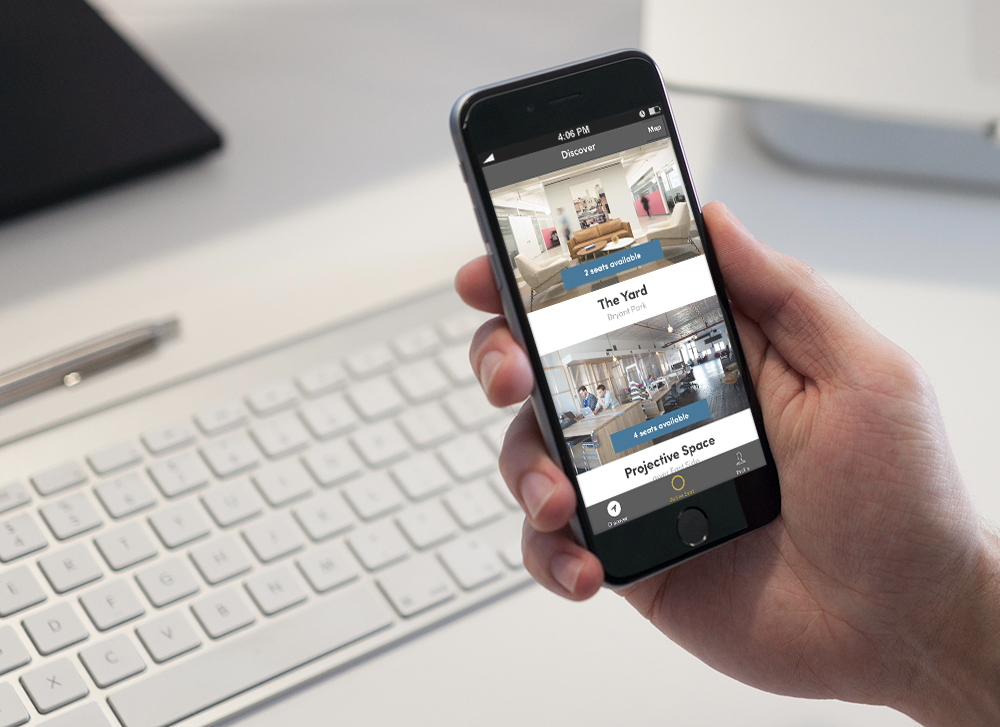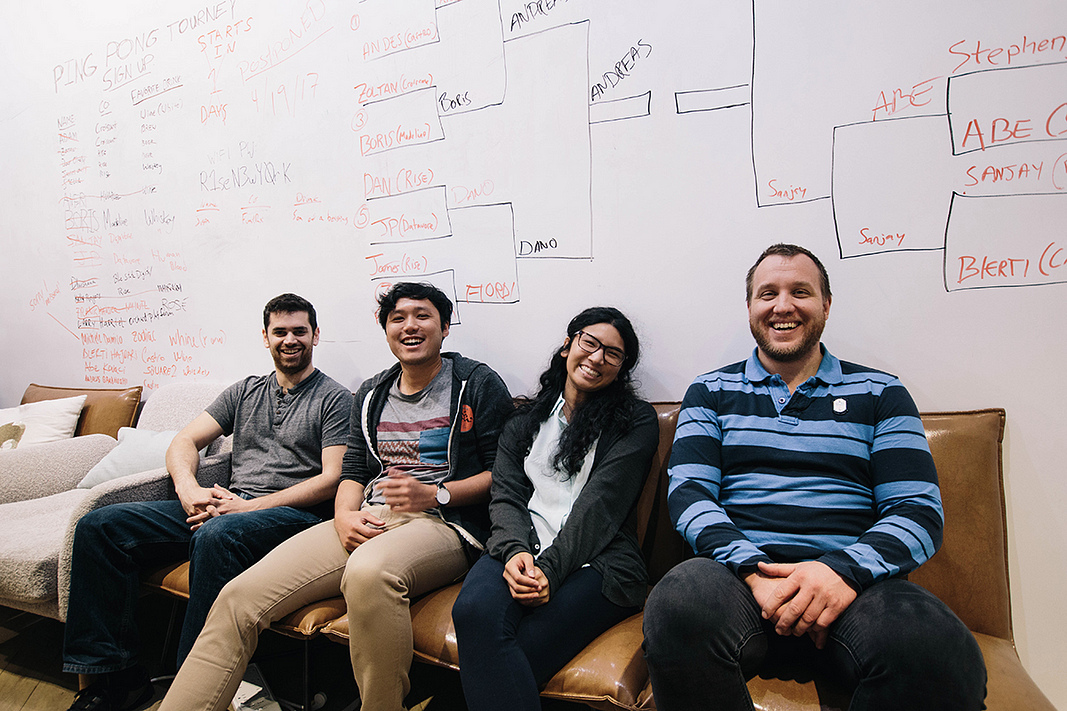Let’s get real for a moment — what’s the first visual that comes to mind when you hear the words “startup founder”? Perhaps some variation of a Silicon Valley stereotype, cemented into consciousness by the HBO show of the same name:
- Cis male (of the bro-y variety);
- Wears a uniform usually consisting of a t-shirt and expensive jeans (that don’t look expensive);
- Walks a shiny (but retro) fixie up those treacherous San Francisco hills;
- Early adopter of nearly any wearable tech;
- Loves AirPods (this is going to be a controversial one).
To confirm this, try a simple Google Image search!
Luckily, our latest Badass Woman breaks this mold entirely.
From the moment I started speaking with Croissant co-founder Nisha Garigarn, I sensed that she’s a much-needed breath of fresh air in the tech world. Open, candid, and genuine, Nisha had a lot to share about the challenges of growing into her role as “entrepreneur,” rising up in a male-dominated realm, and making it all happen in New York City. She represents a new wave of diversity that is challenging the status quo of what startup leadership looks like.
In fact, after completing a four-month stint at a startup accelerator in San Francisco in 2016, she knew that the city was not where she wanted to launch and grow her company. “I appreciated the diversity of New York a lot more after being in San Francisco,” she explains. “Everyone I met there was working in startups or something related to startups. And in my batch, there were only a handful of women founders out of dozens of companies with multiple co-founders. So I understood why people say there’s a lack of diversity in Silicon Valley.”
Croissant is an app that allows you to find and book seats at coworking spaces. According to their website, the platform “makes it easy to find workspaces on the go. Try new coworking spaces or drop by your comfortable favorites. Our membership allows you to be productive wherever your life takes you.” NYC is undoubtedly a hub for entrepreneurs, freelancers, and remote employees, so it’s not hard to agree that Nisha and her team chose wisely.
Bringing ideas to life
For Nisha, the inspiration for Croissant came from her own experience shifting from a full-time office job to a more flexible work life. She had relocated from Los Angeles to NYC in 2013 and had naturally become enamored with the city — but she quickly realized that her new desk job wasn’t satiating the desire for change and excitement that had compelled her to make the move in the first place.
“Moving to New York made me realize that it wasn’t only my environment that was making me feel unfulfilled. It was what I was doing with my life. Moving wasn’t going to change that,” she explains. That’s when the desire to do something different first popped into her mind.
She continues: “At my full-time marketing job, they had this game where you could spin a wheel and get a prize, one of which was a chance to go work at one of our other offices around the world. All I wanted was to travel and work, and at the time it seemed like the only way I could do that was to win the silly wheel-spinning game. I didn’t win, but it made me realize that I wanted to find a way to do cool things while being productive.”
By the time Nisha and her co-founders came up with the idea for Croissant, she had already quit her full-time job and had begun working on a different startup idea. Not having a background in technology, Nisha was starting to feel that in order to pivot her career path, she’d need to hone new skills. An intimidating prospect — but one that so many of us who make mid-career shifts have to face.
“I tried to find work doing marketing at startups, but they were only hiring developers. So I was like okay, if I learn these skills I can have more opportunities to choose what kind of job I want, instead of just going to the first company that would hire me,” she recounts. “So I started to learn how to code. I had taken a coding class in college so I wasn’t going into it completely blind, but it was the first time I was taking it seriously as a career option.”
Being a first-generation American and child of Thai immigrants, education was always a focus. So while programming was certainly a deviation from marketing, Nisha was able to draw from her childhood experiences to devote herself to learning the craft.
“Growing up, I loved being creative, but mostly I wanted to get good grades, get into a good college, and then I hoped I would figure it out from there,” she remembers. “My dad is a programmer, so I always had tech in my life and he encouraged me to learn how to code. I never did it as a child, but I was always using computers.”
As she continued to sharpen her coding abilities, Nisha started attending hackathons, where she began to understand the power of being a programmer. “I was like, oh, wait — I can actually* make* things with this new skill that I have. I can go into a hackathon with just an idea and walk out with something functional. I’d never felt like that before.”
Things had finally started to fall into place for Nisha after years of never fully knowing what she wanted to do. Ultimately, Croissant began as a hackathon idea for an app that would allow users to reserve seats at coffee shops. It stemmed from something she had been looking for herself: “I always thought it was so romantic to be able to go to a cafe and work,” she says. “To be able to take my laptop and be productive in a cool environment.”
After the hackathon, it was clear that the idea had potential. “[My co-founders and I] never went into it thinking like, let’s research the market, let’s see what potential there is monetarily for this thing. We just built an app that solved a problem we had,” she says. “But then TechCrunch wrote about our app and people on Twitter were really excited about it. They were like, ‘when are you going to launch in my city?’”
It was then that Nisha and her co-founders, Adam Chew, Dave Idell, and Zoltan Szalas, realized that they had a viable business opportunity. They decided to pursue Croissant full-time, and eventually launched in NYC with three coworking space partners. During this time, Nisha and one of her co-founders took the opportunity to travel through Europe for six months, working their way around its major cities and developing relationships with coworking spaces from Berlin to Bucharest. Now, they have partners in cities across the US, Europe, and in Canada.
That pesky glass ceiling
Nisha’s role at Croissant encompasses marketing strategy and design. But as they’ve started to expand their business, her position as an outward representative of the company is starting to take shape. As the only woman on Croissant’s executive team and a generally introverted person, she has to overcome both internal and external obstacles on a daily basis.
Often when attending meetings, Nisha realizes she’s the only woman in the room. This understandably hinders her confidence.
“I struggle with feeling like I should be a certain way. I’m a quiet person, and I feel shame and guilt about that sometimes. In general, I don’t like speaking in groups and I often don’t feel like I have enough confidence. So thoughts like *I didn’t speak enough during that meeting *cross my mind all the time,” she says. “And I do feel uncomfortable if everyone else in the room is a guy. I don’t want to speak up.”
Unlike most of us, however, she’s actively working to find solutions to these challenges. Going to networking events has helped her realize the importance of relying less on others to make introductions and pull her into conversations. To work on building confidence and getting better at public speaking, she’s started taking improv classes at Upright Citizens Brigade (UCB): “I kinda hate it, but it’s good for me to practice going up in front of people and saying random stuff, and then realizing that no one cares. It’s terrifying but good practice for real life.”
To combat the overwhelming feeling of being a minority in a room full of male peers, Nisha taps into the growing pool of resources for female entrepreneurs in NYC, like office hours and community events. Connecting with other women who face similar obstacles allows her to gain practical advice that she can apply in day-to-day situations.
The advice she receives often reveals the reality of what female leaders in business and technology have to deal with: “One tip I got from a mentor was when you’re starting a conversation with two men, make sure to speak within the first few minutes. If you insert yourself in the beginning, the guys will physically turn toward you and include you more throughout the conversation. Otherwise, it can end up being a conversation between the two of them and you’re just… there.”
When Nisha explained this to me, it sounded problematic — to place the onus on women, particularly those who don’t ooze confidence, to make themselves visible — but then I remembered that this is the sort of thing we deal with all the time, across sectors. And in safe spaces where women can speak candidly to one another, words of advice like this are commonly heard. Nisha and I agreed that if we’re honest, these kinds of tips are actually really helpful (despite what they signify).
Nisha also cites familial support as influencing her growth as a cofounder. “My biggest mentor is my mom — she talks me through things and encourages me. She has a less traditional Asian mom view of entrepreneurship; she has always been of the mindset that if it doesn’t work out, it’s fine. I’m still young. I don’t know what I would have done if my parents were against the startup thing. I don’t think I would have done it.”
NYC as a home base
When our conversation shifts back to Nisha’s passion for coworking and freedom from cubicles, her eyes light up. “Working from different places is very inspiring for me. If I’m ever in a funk, just changing where I am has always been rejuvenating. I try to switch up my workspace a lot during the week. Even if I’m not really talking to people, it’s like okay, I’m part of society.”
She recently moved to Downtown Brooklyn after living in Bushwick, Harlem, and then Astoria. While she admits the neighborhood isn’t the quaintest, Nisha has found her list of cozy local go-tos — which naturally includes “a ton of coffee shops.” Of her favorites to work from, she says: “A Devocion opened nearby that’s airy and has great tiles, and my neighborhood spot is called AVA Brew. We also have DeKalb Market Hall nearby, which is an underground food market. Their WiFi isn’t the greatest, but the food and coffee at Nobletree make up for it!”
Considering Nisha is essentially an expert on all things related to working remotely, I had to know what a typical weekday looks like for her. She details: “I like to go to coffee shops in the morning, and I find that journaling really helps with getting out of my head and de-stressing. So if I can, I’ll go somewhere in the morning, journal a bit, and then get to work,” she says. “[At Croissant] we kind of make our own hours which can be good and bad. Our whole team is based in New York but we don’t have an official office and we communicate mostly through Slack.”
Her strategy for maintaining productivity throughout the chaos includes ensuring she restricts phone calls and meetings to certain days. “That way, I can just go to a coworking space and get eight hours of focus time in. I try to schedule calls in certain chunks of time blocks so that I don’t get constantly distracted by them.”
Looking ahead, Nisha is focused on continuing to grow the Croissant platform around the world. If she embodies what the future of the tech industry (and STEM as a whole) can look like, I’m all in.
Let us know what you think of Nooklyn Stories by tweeting us @nooklyn, reaching out on Facebook, or finding us on Instagram @nooklyn.stories!
All photos provided by Nisha Garigarn.



